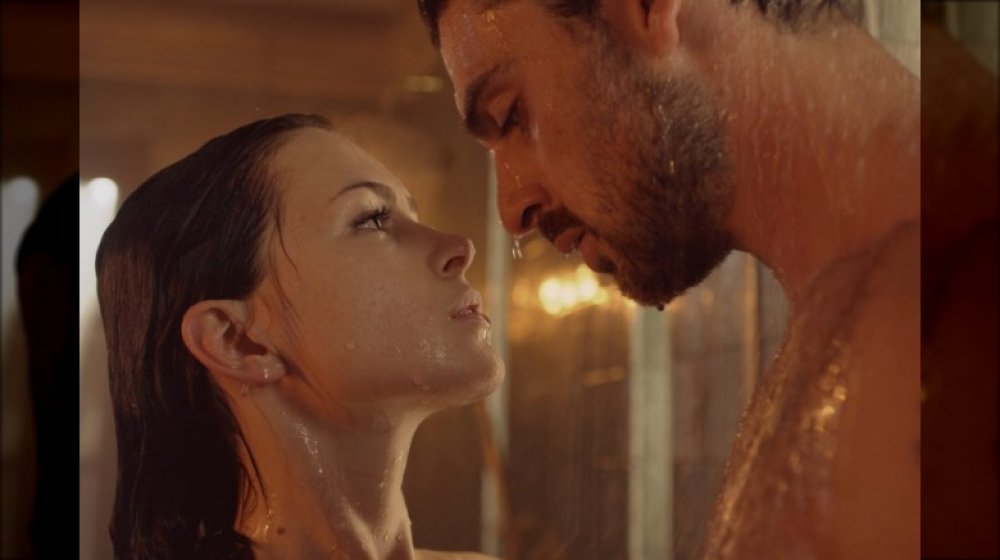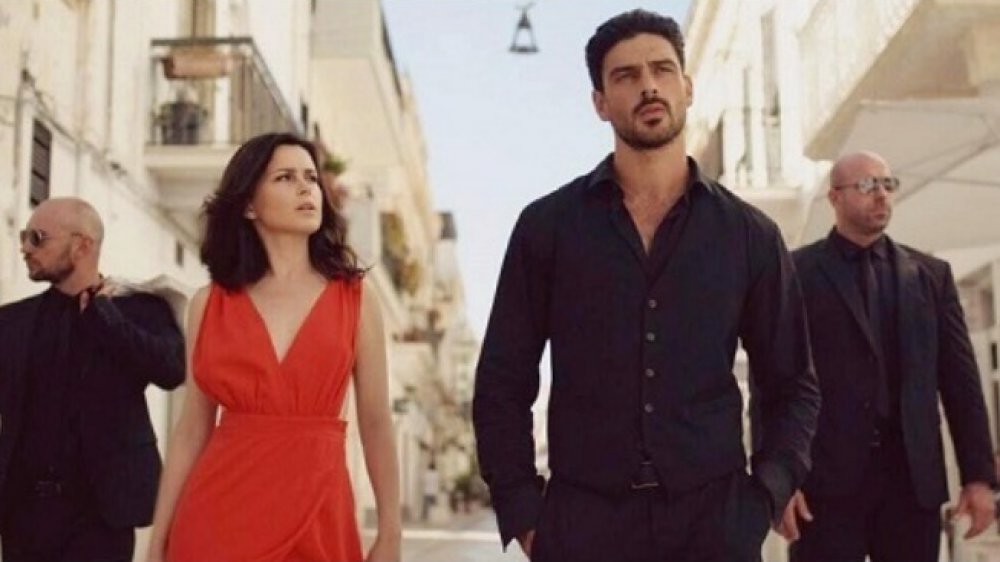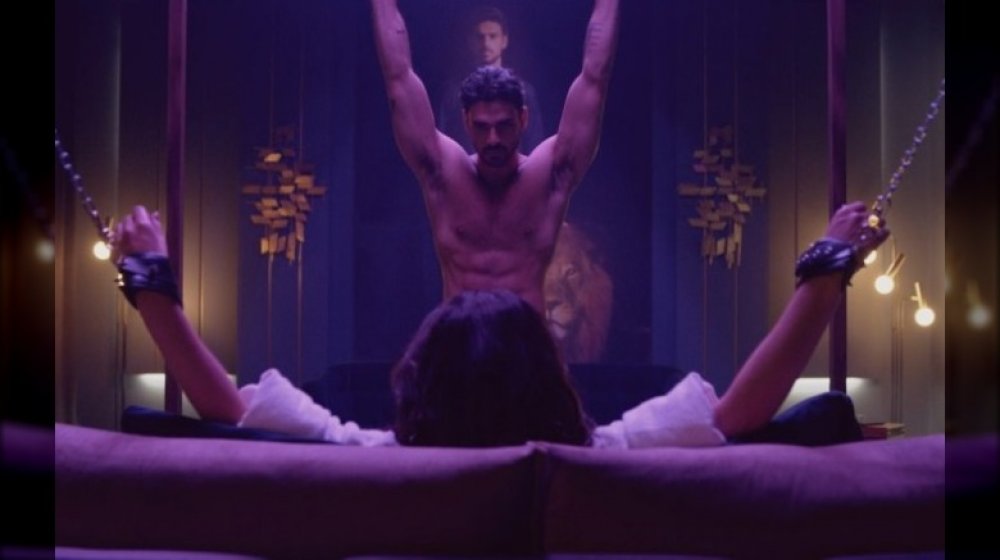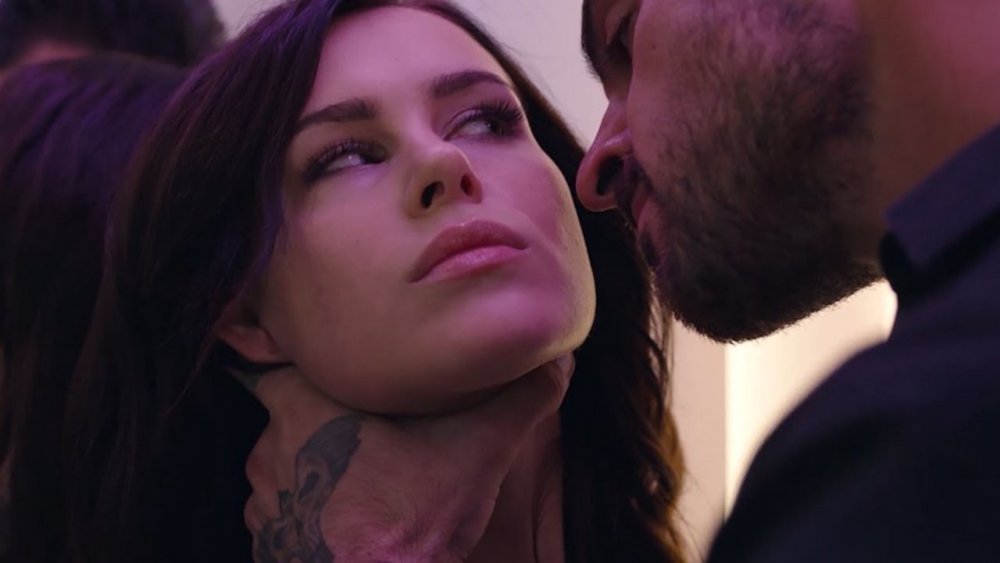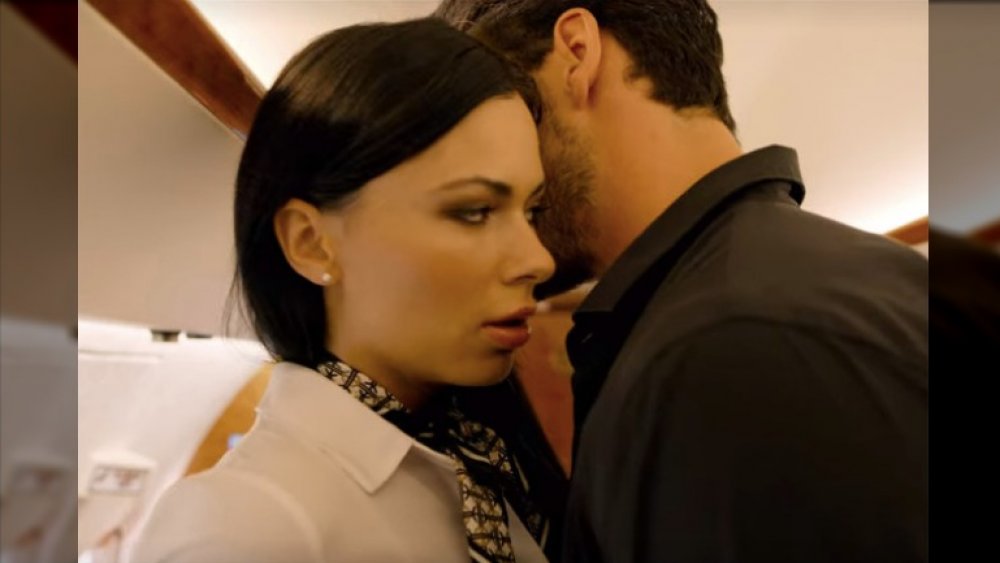The Scandalous Foreign Thriller That's Taking Over Netflix
We might be living at a time in which every (mostly unknown) title listed under Netflix's top 10 is befuddling to the streaming service's users at best, but that doesn't mean those titles aren't still courting controversy. For the latest example of this, look no further than 365 dni, an Eastern European "erotic-thriller" that critics have overwhelmingly compared to the 50 Shades of Grey franchise since its June 2020 Netflix debut. (And considering how much bad press 50 Shades of Grey has gotten over the years, that's saying something.)
365 dni (or 365 Days, the film's English title equivalent) centers on the character Laura (Anna-Maria Sieklucka), a Polish woman who at the onset of the film finds herself kidnapped by Massimo (Michele Morrone), a member of the Sicilian mob, during a vacation to Italy with her neglectful boyfriend. Spurred by a vision, Massimo claims to Laura that she is his soulmate, and he intends to keep her his prisoner for a year (hence the movie's title) to prove it.
To say that the premise of the movie is problematic — especially in the advent of the #MeToo movement — is putting it lightly. It also raises questions as to how and why a film which at the surface seems to entirely romanticize lack of consent and Stockholm syndrome has become the Netflix equivalent of a blockbuster. The answer might be a bit more complex than you think.
The premise of '365 dni' is stirring up serious controversy
Since its Netflix release, major media outlets have deemed 365 dni an erotic film that goes beyond titillation. Decider called the flick "the closest thing to porn on Netflix," citing one scene alone that will most likely make the term "boat tryst" a whole meme unto itself. Based on the first book in a trilogy by Polish author Blanka Lipińska, 365 dni's appeal at first blush might be the series of "sexcapades" within the film's one-hour-and-56-minute run-time, but its apparent treatment of Stockholm syndrome — a psychological condition in which hostages develop feelings of allegiance to their captors — is what both critics and viewers have chosen to zero in on.
One article published by the New York Post highlighted reactions from viewers on social media. Many railed against framing the movie's major storyline as romance, suggesting the film could be more accurately described as a "glamorizing of criminal power dynamics" and that the attractiveness of mafia kingpin Massimo distracts from the undercurrent of abusive coercive control. Another critic tweeted that the movie "romanticizes kidnapping [and] a forced relationship."
In the same vein, Variety called the flick "a thoroughly terrible, politically objectionable, occasionally hilarious Polish humpathon." In a more serious turn, the review honed in on the heart of 365 dni's controversy: a thesis which more or less states that "that consent can be obtained retroactively."
Critics compare '365 dni' to 'Fifty Shades of Grey'
365 dni has generated a lot of comparisons to the Fifty Shades of Grey franchise. The former may also branch out into its own multi-flick series (if you go by the twist ending, that is), but critics have caught on to a number of controversial themes present in both movies.
As Variety points out, both Fifty Shades and 365 dni take their cues from tropes found in older tales such as Beauty and the Beast, in which an "alpha male" antihero, cast as a romantic lead, is ultimately rewarded for obliterating the autonomy of his love interest. But it's 365 dni's premise that kicks it up a notch. Per Variety, "Imagine Beauty being OK with captivity and with the Beast killing villagers as long as he gave her a bunch of orgasms on a yacht."
When it comes to ethical murkiness, Decider's Meghan O'Keefe sums it up like this: "While Fifty Shades of Grey's [Christian] was an emotionally abusive, controlling, and toxically jealous boyfriend...Massimo ups the ante by straight up kidnapping Laura against her will and killing rival gangsters who rub up on her in a club."
Behind-the-scenes details about '365 dni'
Now that you've heard critics' thoughts, it's only fair to get into the more general nuts and bolts of this Polish erotica — especially considering that, according to the Polish news outlet Onet, plans are in the works for a sequel, though filming has been delayed due to the coronavirus pandemic.
Though some sources erroneously reported author Blanka Lipińska directed the adaptation of her first book, it was duo Barbara Białowąs and Tomasz Mandes who actually helmed the picture. This is the first time both Poland-born directors have teamed up, but both are far from unseasoned when it comes to the industry, having respectively (as per their IMDb pages) directed a slew of thrillers (and in the case of Mandes, television episodes) since the early aughts. From all appearances, however, 365 dni is their first effort to have had such a wide international release.
While Anna-Maria Sieklucka (Laura) might have only worked on Polish-speaking films (including 365 dni) until now, the same can't be said for Italian actor Michele Morrone (Massimo). As per IMDb, the Netflix thriller marks his first film credit outside of his native country.
Despite the fact that most international critics have reacted negatively to 365 dni since its Netflix release, what do those who worked on the production think of the heir apparent to 50 Shades of Grey? Luckily, one main crew member on the film has since spoken out about the backlash.
Is Netflix's '365 dni' worth watching? One cinematographer says yes
While critics have been quick to point out the way 365 dni plays fast and loose with power differentials and consent, one of the main players involved in the film's production relayed utter bafflement by this reception.
In an interview with Variety, cinematographer Bartek Cierlica expressed shock at accusations of sexism levied against 365 dni, countering them with an intended portrayal of Laura with strength and agency. Citing inspiration from Fifty Shades of Grey and Beauty and the Beast, Cierlica asserted that Laura, unlike the Belles of yore, is a "female hero is far stronger and more emancipated than the girls from old fairy tales."
Cierlica went on to tackle the idea of 365 dni being seeped in the pornographic (in response to one critic calling the film "rich porn," Cierlica replied, "I don't know if to feel offended or flattered"), but set the record straight with the production's intent. Explaining they wanted to create the most "intimate" atmosphere possible, Cierlica stated that the crew was limited to the bare minimum needed, with only a handheld camera used for filming. "[We wanted it to] be natural, authentic, but not to cross the border of pornography," he added
Now that we've explored the controversy surrounding 365 dni, the question remains: Should you watch it? Now that you have all the information, it's up for you to decide.

